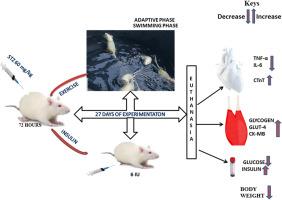Swimming exercise regulates indices of skeletal muscle glucose metabolism and attenuates cardiac inflammatory cytokines activity via IL-6/TNF-α pathway in streptozotocin-induced diabetic rats
Q2 Medicine
引用次数: 0
Abstract
Diabetes mellitus (DM) manifests with impaired glucose metabolism that affects the musculoskeletal and cardiovascular systems. This study investigated the effects of swimming exercise on some indices of muscle glucose metabolism and cardiac inflammatory markers in diabetic rats induced with streptozotocin. Wistar rats of both sexes (150–200 g) were assigned into five groups of seven (7) rats. Group 1: Control (CON), Group 2: Diabetes only (DM), Group 3: Exercise only (EX), Group 4: Diabetes + Exercise (DM + EX), Group 5: Diabetes + Insulin (DM + IN). Type 1 DM was induced via intraperitoneal injection of streptozotocin (60 mg/kg). Insulin (6 IU/g) was administered (IP) to animals in group 5. Swimming exercise test was done for 27 days after which animals were euthanized. Blood samples were collected while hamstring muscles and heart were harvested and homogenized to assess biochemical parameters. The body weight, serum insulin level, muscle glucose metabolic indices (glycogen, Glut-4, CK-MB), and cardiac troponin-T were significantly (P < 0.05) decreased. In contrast, the random blood glucose, cardiac TNF-α, and IL-6 levels were increased (P < 0.05) in diabetic rats when compared with the control group. Swimming exercise regimen significantly (P < 0.05) reversed these anomalies by reducing blood glucose and cardiac inflammatory cytokines (TNF-α and IL-6) levels, improving serum insulin, muscle glycogen, and GLUT-4 expression in diabetic rats when compared to the DM group. The cardiac inflammatory cytokine levels in DM + EX were comparable to the DM + IN group. In conclusion, swimming exercise improves muscle glucose metabolism and protects the heart against cardiac inflammation in diabetic conditions.

游泳运动通过 IL-6/TNF-α 途径调节链脲佐菌素诱导的糖尿病大鼠骨骼肌葡萄糖代谢指标并减轻心脏炎症细胞因子的活性
糖尿病(DM)表现为葡萄糖代谢受损,影响肌肉骨骼和心血管系统。本研究探讨了游泳运动对链脲佐菌素诱导的糖尿病大鼠肌肉葡萄糖代谢指标和心脏炎症指标的影响。将雌雄 Wistar 大鼠(150-200 克)分为五组,每组七只。第 1 组:对照组 (CON);第 2 组:仅糖尿病组 (DM);第 3 组:糖尿病组 (DM)第 3 组:仅运动(EX),第 4 组:糖尿病 + 运动(DM + EX),第 5 组:糖尿病 + 胰岛素(DM + IN)。通过腹腔注射链脲佐菌素(60 毫克/千克)诱发 1 型糖尿病。游泳运动测试持续 27 天,之后动物被安乐死。采集血液样本,同时收获腿筋肌肉和心脏并匀浆,以评估生化指标。体重、血清胰岛素水平、肌肉葡萄糖代谢指数(糖原、Glut-4、CK-MB)和心肌肌钙蛋白-T显著下降(P< 0.05)。相反,与对照组相比,糖尿病大鼠的随机血糖、心脏 TNF-α 和 IL-6 水平升高(P < 0.05)。与 DM 组相比,游泳运动能降低糖尿病大鼠的血糖和心脏炎症细胞因子(TNF-α 和 IL-6)水平,改善血清胰岛素、肌糖原和 GLUT-4 的表达,从而明显(P < 0.05)逆转这些异常现象。DM + EX组的心脏炎症细胞因子水平与DM + IN组相当。总之,游泳运动能改善糖尿病患者的肌肉葡萄糖代谢,保护心脏免受心脏炎症的影响。
本文章由计算机程序翻译,如有差异,请以英文原文为准。
求助全文
约1分钟内获得全文
求助全文
来源期刊

Obesity Medicine
Medicine-Public Health, Environmental and Occupational Health
CiteScore
5.50
自引率
0.00%
发文量
74
审稿时长
40 days
期刊介绍:
The official journal of the Shanghai Diabetes Institute Obesity is a disease of increasing global prevalence with serious effects on both the individual and society. Obesity Medicine focusses on health and disease, relating to the very broad spectrum of research in and impacting on humans. It is an interdisciplinary journal that addresses mechanisms of disease, epidemiology and co-morbidities. Obesity Medicine encompasses medical, societal, socioeconomic as well as preventive aspects of obesity and is aimed at researchers, practitioners and educators alike.
 求助内容:
求助内容: 应助结果提醒方式:
应助结果提醒方式:


